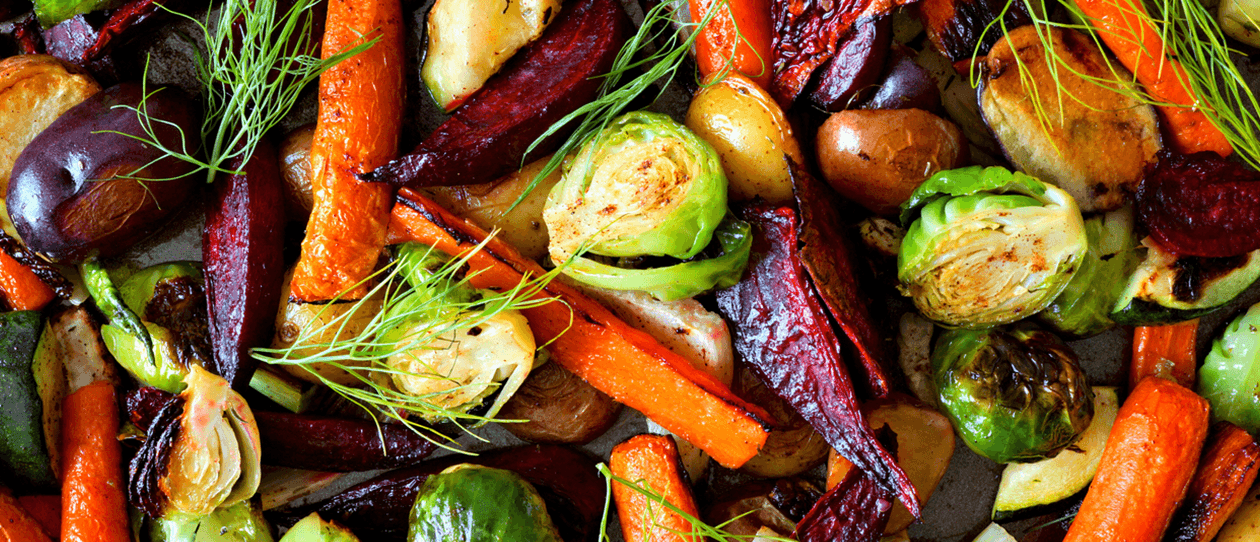
- Health hub/
- Tips & Advice on Improving your Everyday Health/
- Why consider going vegetarian?


There are many benefits to including more vegetables in your diet. This includes more colourful and visually appealing meals, as well as benefits to your health and the environment.
It’s also becoming easier and more accessible to access a diet high in vegetables due to more vegetarian dining options, an increase in creative and delicious vegetarian recipes, a growing influence of cultures that are largely plant based, as well as the vegetarian products available in supermarkets these days. This includes products like cauliflower pizza, cauliflower rice, zucchini wedges and zoodles which are zucchini noodles.
Let’s now go into these benefits.
Reasons to eat more vegetables
A healthy, balanced diet
As well as adding more colour to your meals, different fruits and vegetables contain different combinations of fibre, vitamins, minerals and other nutrients, so it’s ideal to eat a variety. The more different colours you have, shows the variety of nutrients you will be ingesting!
Maintain healthy weight
As vegetables are low in calories and contain fibre to help you feel full, vegetables can contribute to maintaining a healthy weight. One longitudinal study showed that increasing the consumption of fruit and vegetables is related with weight loss. Berries, apples, pears, soy, and cauliflower were associated with weight loss while starchier vegetables like potatoes, corn, and peas were linked with weight gain.
Possible long term health benefits
Compared with meat eaters, vegetarians tend to consume less saturated fat and cholesterol and more vitamins C and E, dietary fibre, folic acid, potassium, magnesium, and phytochemicals (plant chemicals) such as carotenoids and flavonoids. As such, they're likely to have lower cholesterol, lower blood pressure, and lower body mass index (BMI).
The 5 A Day campaign is based on advice from the World Health Organization (WHO), which recommends eating a minimum of at least 5 portions of a variety of fruit and vegetables every day. That's 5 portions of fruit and vegetables in total, not 5 portions of each. A portion of fruit or vegetables is 80g. However, you still need to follow dietary guidelines as eating too many calories from non meat foods can still lead to gain weight. It's also important to replace saturated and trans fats with good fats, such as those found in nuts, olive oil, and canola oil.
Digestive health
Vegetables are a good source of soluble fibre, that dissolves in water and other body fluids. It forms a gel-like material as it passes through. Once it makes it to the colon, it feeds your good gut bacteria.
The skin of vegetables also contains insoluble fibre which doesn't absorb water and sticks to other materials to form stool. This process leads to softer, bulkier and more regular stools, helping to prevent constipation.
Vision
Harvard also refers to studies that show eating fruits and vegetables can also keep your eyes healthy and may help prevent two common aging-related eye diseases, cataracts and macular degeneration.
Lower environmental impact
Beef has low efficiency in converting natural resources to food and require higher water and land use than any other livestock systems. Beef supply chains are estimated to emit about 40% of all livestock greenhouse gas emissions.
Animal-based foods are typically more resource-intensive and environmentally impactful to produce than plant-based foods. In response to the need for more sustainable food systems, Lancet EAT Commission in January 2019 launched The Planetary Health Diet.
This diet is flexible as it provides the ability to eat meat but limiting consumption of red meat to about 98g serving a week. Visually, it is half a plate of fruits and vegetables. The other half consists of primarily whole grains, plant proteins such as beans, lentils, pulses, nuts, unsaturated plant oils, modest amounts of meat and dairy, and some added sugars and starchy vegetables. Farmed seafood is the primary animal food along with moderate amounts of poultry and eggs.
Reap the benefits without going fully vegetarian
As you can see, you don’t need to follow a full vegetarian diet to reap the health benefits. The Planetary Health diet is one. The Mediterranean eating pattern, is also another, known to be associated with longer life, which features an emphasis on plant foods with a sparing use of meat.
Obtaining essential nutrients from a diet plentiful with vegetables
Protein
Some of the best foods with which to replace meat include Lentils, chickpeas, black beans, tofu, quinoa, nuts, green vegetables, particularly, kale, broccoli, seaweed, and peas.
Iron
Iron is an important mineral that is involved in various bodily functions, including the transport of oxygen in the blood. Although there are vegetarian foods that contain iron, it’s in the form of non-haem iron, which is not absorbed as well as the iron in meat (haem iron). Combining non-haem iron-containing foods with foods high in vitamin C and food acids, such as fruit and vegetable, helps your body absorb the iron.
Good vegetarian food sources of iron include Cereal products fortified with iron (such as breakfast cereals and bread), wholegrains, legumes, tofu, green leafy vegetables and dried fruits.
Zinc
Zinc performs numerous essential functions in the body, including the development of immune system cells. Good vegetarian food sources of zinc include nuts, tofu, miso, legumes, wheatgerm wholegrain foods.
Calcium
Calcium is vital for strong bones and teeth and for healthy functioning of nerves and muscle tissue.
Good vegetarian food sources of calcium include dairy or plant-based milk drinks fortified with calcium, tahini (sesame seed paste), leafy dark green vegetables (especially Asian greens), legumes and some nuts, such as almonds and Brazil nuts.




